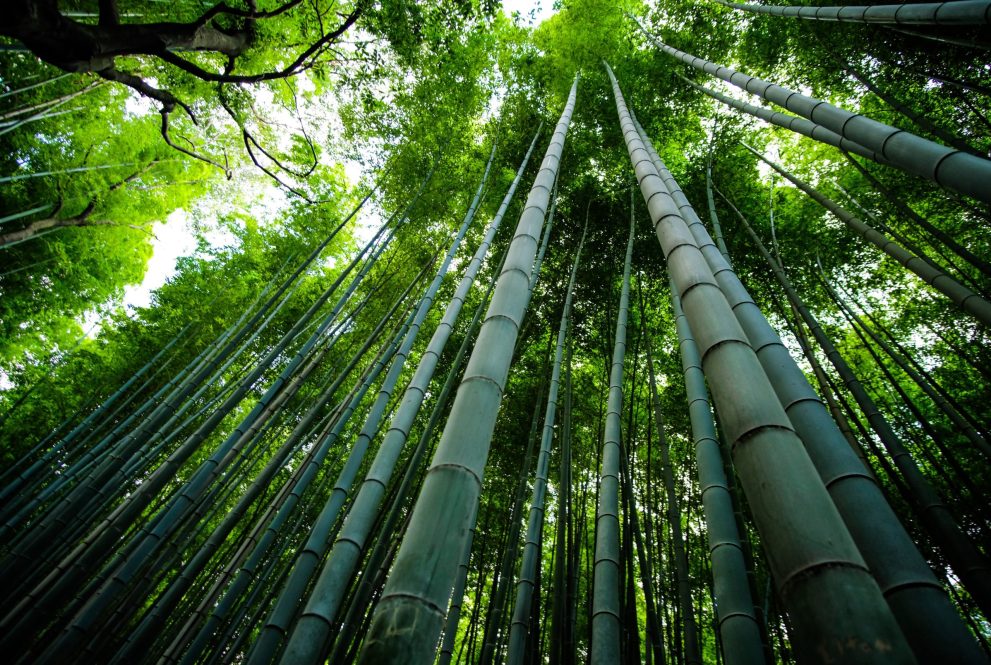Cultivated mainly in Asian, African and American tropics, Bamboo is a real player in the fight against climate change. This plant at various assets is increasingly used as an ecological alternative to substitute plastic, especially in architecture, construction, clothing, kitchen accessories or desktop accessories.
With this rise in bamboo use, the question we could ask is that of deforestation. The cup of bamboo She entails the deforestation? Is the use of bamboo harmful for the planet? We answer you.
1. Bamboo, a plant that does not affect biodiversity
Contrary to what one might think, bamboo does not hurt biodiversity. Indeed, there are more than 1300 bamboo species, and that used for the production of objects, furniture and construction is not the same as the one where some protected animal species live like the pandas.
the moso bamboo is the most frequently used species for furnishing, building and manufacturing objects and accessories. This species of bamboo, otherwise named winter bamboo, is a kind of giant bamboo reaching up to 28m high and capable of withstanding extreme temperatures. In just 1 day, he is able to develop between 0.50m and 1m. After cutting, The Moso bamboo pushes naturally and multiplies without the need to replant. This makes its culture and use "industrial" in total coherence with the world of tomorrow.

2. Bamboo, a fast growing plant
Bamboo is an ultra-resistant plant capable of withstanding the most extreme weather conditions. Indeed, it adapts to any condition: low temperatures, heat and humidity, high altitude and drought.
It is also a plant distinguished by its rapid growth. Indeed, only 4 to 6 years are enough for bamboo to reach its adult size, unlike other trees that will put nearly 100 years. In addition, bamboo has the ability to regenerate without any energy or human means, which limits CO2 emission. He pushes without the need for fertilizer, pesticides or irrigation. Thus, after the bamboo cut, the forests naturally refocate in just a few years. The cut does not result in deforestation, on the contrary, it allows stimulate.
3. Bamboo, a plant that restores soils and captures CO2
Bamboo has excellent ability to limitSoil erosion. Indeed, it restores the soil by eliminating some toxins and thus participates in the regeneration of the land by bringing carbon and oxygen. Thus, bamboo is very useful for rebounding arid land, regenerating degraded lands and damaged by erosion and help plants around the surroundings grow. It is also capable of filtering water by absorbing heavy metals and lead, and cleaning polluted water.
That's not all, bamboo is also an excellent CO2 sensor capable of fixing Up to 30% CO2 more than trees. It also frees 30% oxygen more than any tree.
This material also participates in the Reduction of carbon emissions Because bamboo is very light, which requires much less energy during transport, unlike solid wood that is a heavy material with more constraints during transport.

4. Bamboo, ancestral use
Used for millennia in Asia, bamboo cultivation is a Ancestral know-how. Very used as a building material in Asian countries, bamboo has become a real architectural art.
It is an innovative material with multiple uses: furnishing, homemade, frame, walls, scaffolding, kitchen accessories, beauty accessories, tools, office accessories, etc.
Its cultivation, unaware, allows massive use of bamboo. Unlike classical forests, it is precisely necessary to cut bamboo In order to avoid too much spread and thus control production. Indeed, it is a plant that is renewed so quickly that the deforestation of a bamboo forest is almost impossible.
Conclusion
Considered a Invasive plant developing at high speed, its production and its culture requires being reasoned and controlled to limit the deforestation of surrounding forests. In fact, by controlling its production, it is then necessary to preserve the complex ecosystem of classical forests, different from that of the bamboo forests. This reasoned culture allows preserve ecosystems And do not harm biodiversity.
Alternative to plastic par excellence, bamboo is a material Solid, durable and ecological who revolutionizes our way of consuming. Bamboo being a sustainable material, bamboo-made products have a longer life than those in plastic. By consuming better and more responsively, polluting plastic waste is considerably limited.
From the bamboo harvest to the final product, the manufacture of bamboo accessories is ancestral know-how and requires several necessary steps to maintain the quality bamboo.

The table display: a simple and effective tool to achieve your goals
6 simple tips to get green at the office